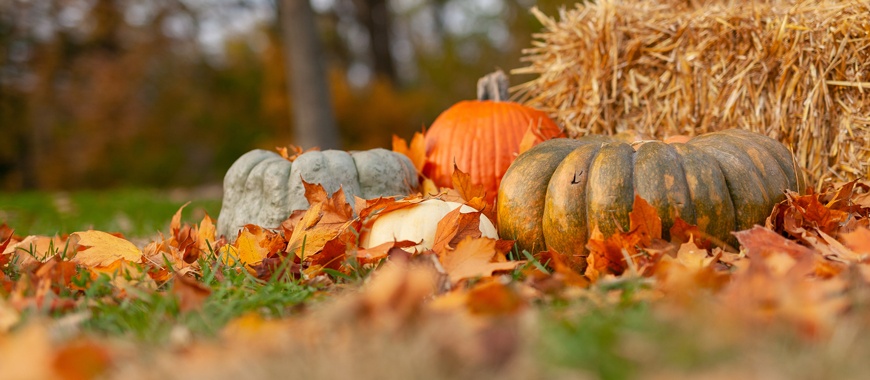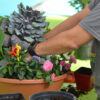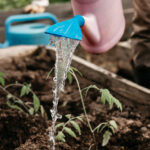Spooky season is upon us but that’s no reason to neglect your garden! There’s still plenty of work to be done before it’s ready for winter. A little maintenance now will make for a healthy and beautiful landscape next spring.
Garden
- Remove all debris from the garden. Leaving debris will increase your chances of diseases and insects attacking next year’s plants.
- Amend your soil with cotton bur or a composted manure mix. Your soil should have adequate organic matter incorporated into you soil. Till it into the top 6-10 inches of topsoil.
Lawn
- Fall is a great time to aerate your lawn. Aeration loosens the soil of compaction and supplies important oxygen to the soil and roots. Aerating your lawn can also help decrease the thatch layer in your lawn.
- In Mid-October, Fertilome Winterizer Fertilizer can be applied. This application should be watered into the soil profile.
- As the time approaches to mow your lawn for the last time, mowing heights should be reduced throughout the fall. The last mowing should be mowed at the lowest setting. Short lawn heights allow proper air movement and prevent matting of the grass.
- Remove leaves from your lawn to prevent it from becoming smothered by the leaves.
Perennials
- As we receive killing frosts (28 degrees and lower), perennials begin to go into dormancy leaving brown plants. This is an indicator that they are ready to be cut down, leaving just a little stem. However, you can also leave them until Spring to provide insulation during the winter. Grasses should always be left until spring to trim down, the tall foliage will add to your winter landscape. If you do cut your perennials back for the winter, make sure to spread a layer of mulch (shredded decomposed wood) for extra insulation over the root zone. Spread Fertilome Winterizer Fertilizer in your perennial beds to give plants a boost in the spring.
- It is also finally time to plant fall bulbs. Fall bulbs include tulips, daffodils, allium, crocus and hyacinth (to name a few). Most bulbs (except the crocus) should be planted at least 6” deep from the tip of the bulb. When digging your holes place a mixture of bone meal or Dutch bulb food and sand at the bottom of the hole. The sand will help drain water away from the bulb and the bone meal will give phosphorus which is important for root and bulb development. Bulbs should not be planted until after the first hard freeze, and when temps are in the low 60’s or lower consistently.
Shrubs
- Most shrubs will benefit from trimming, however there are some that should not be trimmed until spring. Shrubs that flower in the summer can for the most part be trimmed, taking off no more than a third of the plant total. It is best to trim out the oldest branches which will often decrease the height. Newer shrubs should not be trimmed for the first year or two. If it has been several years since they were trimmed, it may be time for a rejuvenation trim. With this trimming, you will cut down leaving sometimes a foot or less of the plant to allow it to grow back.
- Hydrangeas are one plant that may not be able to be trimmed until spring. The Arborescens and Macrophylla types can be trimmed in the fall leaving about 6-10 inches behind. Paniculata Hydrangeas should be left until spring. If you are planning on trimming your shrubs and you have never done it before call or stop in to learn proper techniques on your particular shrubs (pictures of the shrubs are helpful if you are not sure what shrubs you have). When you apply Fertilome Winterizer Fertilizer to your lawn spread a little around your shrubs as well for a quick boost in the spring.
Trees
- Sparingly trim trees during this time. Many can be trimmed at any time during the late summer through fall, if some are trimmed to late in the season water sprouts can form the next season. Pruning is an art, treat your trees right and you will have beautiful trees for years to come. Call or stop into our garden center if you have questions about trimming the particular trees you have in your yard.
- Some evergreens such as Arborvitae will experience winter burn. It is vital that you water all plants including evergreens well in the fall to hydrate the needles. When highs are in the 40’s you can also apply a product called Wilt Pruf to keep moisture in the needles throughout the winter months.



